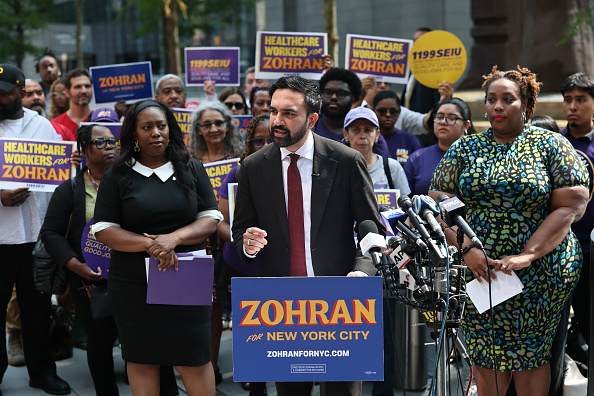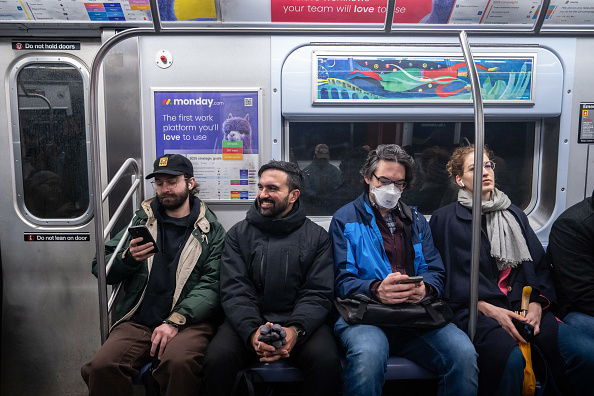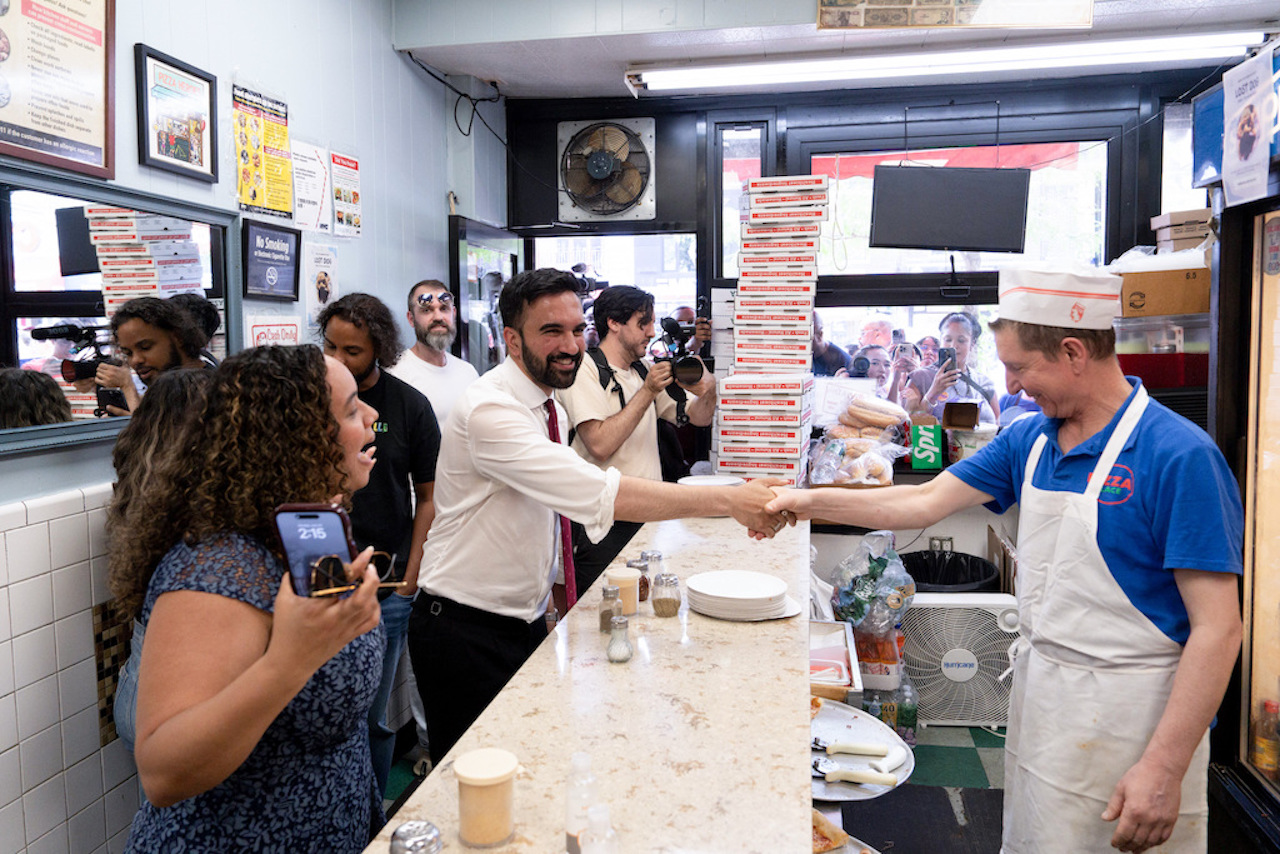This piece was originally published September 30, 2025. On Nov 4, 2025, Zohran Mamdani was elected mayor of New York City, winning 50.4 per cent of the vote to become the city’s first Muslim and South Asian mayor.
Queens Boulevard in New York City runs through what is considered the most ethnically and nationally diverse urban area in the world. With more than 150 countries represented and, by some estimates, more than 200 languages and dialects spoken, it is a haven for newcomers and hyphenated Americans—people whose cultures often go unseen in national politics, but find visibility here.
It’s also where Donald Trump grew up and Zohran Mamdani settled and began his work as a housing foreclosure counsellor.
While decades apart, the two politicians built their lives and careers just miles from each other, but on opposite sides of a political and economic divide. In addition to racial and national diversity, Queens Boulevard also maps the borough’s economic stratification: stretching from working-class newcomer families in Astoria to the insulated wealth of Jamaica Estates. Raised in a mansion, Trump developed a world view of borders, privilege and exclusivity. Mamdani, the son of newcomers and a tenant organizer, rooted his life in Astoria, where struggle, solidarity and survival forged his politics.
Mamdani and Trump’s stories are more than personal contrasts. They embody broader battles that define this political moment. While shaped by the same city, they represent radically different futures, not just for New York City, but also for the world.
The rise of the global politician
The contrast between Mamdani and Trump symbolizes a broader global political shift: while right-wing populism continues to gain traction, leaders like Mamdani are emerging as key figures in a countermovement.
About 34 per cent of Canadians hold a populist viewpoint, according to a study from the Canadian Global Affairs Institute, indicated by the rise of the People’s Party of Canada, led by former Conservative MP Maxime Bernier. In Europe, Giorgia Meloni’s Brothers of Italy soared to dominance in 2022; Marine Le Pen’s National Rally earned about a third of the vote in the 2024 European Parliament elections. Similar voting percentages mark Sweden’s Democrats (30.3 per cent), Germany’s AfD (20 per cent), Spain’s Vox (14 per cent) and Portugal’s Chega (20 per cent).
Mamdani is part of a wave of locally grounded leaders willing to bridge ideological divides
Allie Wong, activist AND PhD student at Columbia University
But against this tide, a different kind of left-leaning leader has also emerged. London’s Sadiq Khan, son of Pakistani newcomers, is pushing housing reform and inclusion. In Sheffield, England, Somali refugee Magid Magid became the city’s first Muslim mayor and a Green Party member of European Parliament, embodying a new, more activist approach to politics in a typically far-right region. In Barcelona, Spain, Ada Colau, once an anti-eviction activist, challenged housing speculation from the mayor’s office. Clémentine Autain in France and Rangsiman Rome in Thailand have brought activist energy and left-leaning populist demands into mainstream governance. These leaders often emerge from dense, diverse cities, where inequality is palpable yet where coalition-building across class, race and religion is actively happening.
In this sense, Mamdani is no outlier—he is part of a broader wave of global municipalism: locally grounded yet willing to bridge ideological divides. These politicians don’t promise to “take back” a country, but to move it forward. As a volunteer on his campaign, I’ve seen first-hand how his ideas invite people to reimagine what civic leadership can look like.
Mamdani’s campaign speaks to urgent civic realities cutting across race, class and party: rising rents, broken transit, growing child-care costs and stagnant wages. These issues aren’t “left” or “right”—they’re human. And by focusing on them, Mamdani has created space for a different kind of political conversation that is rooted in shared experience.
Strongmen versus organizers
Trump’s isolationist viewpoint feels far from Mamdani’s politics—yet both reflect perspectives that are shaped by the same city.
Trump grew up in 1950s and ’60s Queens, before the 1965 Immigration and Nationality Act reshaped New York. His father built housing amid racial transition and was investigated for discriminatory practices. These experiences undoubtedly informed Trump’s zero-sum world view, which has become the core of his political brand. Conversely, Mamdani’s politics arise from his early work in housing reform, a role in which he spoke for communities as much as with them—making housing, transit and affordability moral imperatives.

Through speeches and interviews, Mamdani redirects attention to those New York leaves behind and points to inequality sustained by establishment politics. Born in Uganda and raised primarily in New York, Mamdani brings a transnational perspective shaped by movement and diaspora. Where Trump built his image on dominance and exclusion, Mamdani’s politics are rooted in the promise of upward mobility for all. They represent not just ideological opposites, but also fundamentally different leadership visions—one forged in inherited power, the other in cross-cultural community and struggle.
Rejecting identity politics
Mamdani’s campaign bridged ideologies that rarely meet in electoral politics. In Queens—a district where more than a quarter of voters are Jewish—he engaged directly with Jewish voters after his criticism of Israel’s war in Gaza. As one Jewish voter in Brooklyn told the Associated Press, “We care more about having an affordable city than sowing division.” For some, his willingness to speak honestly, and even critically, about Israel felt more authentic than partisan courtesy. A Reform Jewish resident in Harlem said: “You don’t have to agree with him to feel like he’s telling the truth…Mamdani doesn’t hate me—he hates hypocrisy.” Notably, his approach seems to have upended expectations of division among some Jewish voters. A recent Zenith Research and Public Progress Solutions survey found that Jewish voters favour Mamdani over other candidates with a 17-point lead.
It can be argued that Mamdani’s movement reflects a genuine voter realignment. A June Data for Progress survey showed Mamdani within two points of Andrew Cuomo in ranked-choice simulation—traversing major demographic groups and receiving especially strong support from young, college-educated and Asian voters. Nearly 61 per cent of Asian respondents picked Mamdani in the final round, and he won voters under age 45 by a 14-point margin.
These shifts coincide with broader trends in the United States: more than 60 per cent of Americans feel neither major party represents them adequately, according to Pew Research Center, and an increasingly large cohort—especially under age 50—is open to alternatives beyond Democrats or Republicans.
An embrace of social media
In January, Mamdani was polling at a meagre one per cent. Yet, he leveraged social media to cultivate a following by focusing on everyday problems. A burrito on a Q train during Ramadan became a conversation about food insecurity. A plunge into frigid water off Coney Island became a metaphor for survival in an unaffordable city. Interviews with halal cart owners who are suffering the heightened costs of running their carts elicit questions about the fate of small businesses. His posts are strikingly grounded and authentically charismatic, marked by curiosity, humour, warmth and an insistence on meeting people where they are.

Get the
Three from 3
newsletter
Join our global community of sharp, curious thinkers to receive a carefully curated email of the three most important things to read, see and do this week.
Listen and learn.
Tune into Third Culture Leaders, a podcast hosted by our co-founder and publisher, Muraly Srinarayanathas.
Explore how leaders skillfully navigate multiple cultural landscapes, leveraging their diverse backgrounds to drive innovation and change.
This approach channelled lived experience into political meaning and gave voice to those who felt they had been left out amid the promises of federal right-wing politicians.
A contest of futures
Trump has presented himself as an answer to voters’ anxieties around change and loss. Mamdani’s politics invert that—rooted in belonging not tied to wealth, whiteness, nostalgia or nationalism.
And it’s not just Mamdani. Rising right-wing populism channels discontent into exclusion, yet Mamdani and similar leaders turn disillusionment into empowerment by organizing to redistribute power for all. In the shadow of empire, new coalitions are forming as blueprints for something more humane and more participatory. And perhaps nowhere is this blueprint clearer than in Queens, where the soil has been shaped by migration, labour and contradiction. Here, Trump climbed the ladder of privilege and built walls atop it. Mamdani is breaking these walls down in order to build a city in which all can thrive—a vision of a multiracial, multinational culture, where life, liberty and the pursuit of happiness have no exceptions.
Queens Boulevard has always been a road that cuts across identities, struggles and dreams. Now, it may also be the road that leads a city forward.
Allie Wong lives in New York, where she is a PhD student at Columbia University and a long-time activist.
